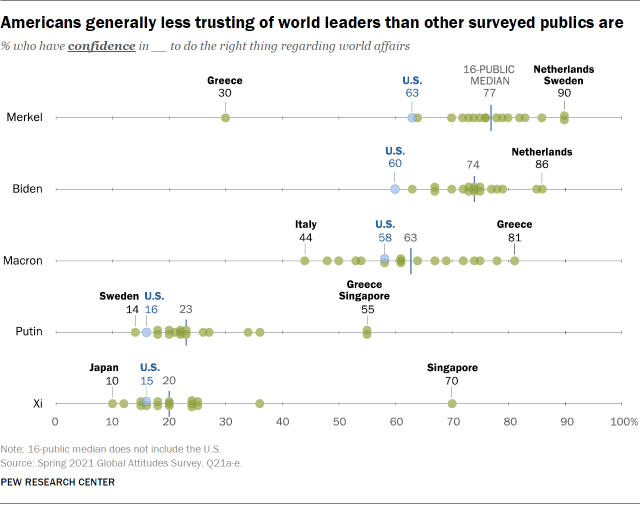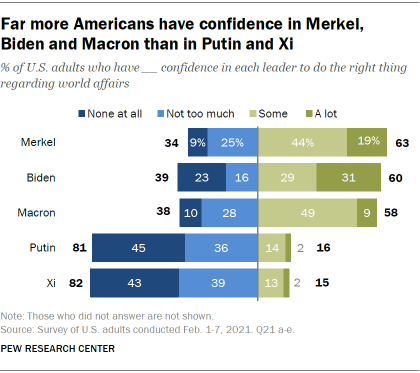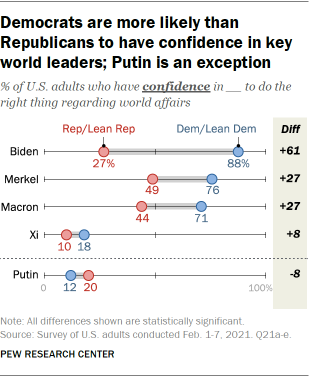Americans generally exhibit less confidence in a variety of world leaders – including U.S. President Joe Biden – than people in Canada, Europe and the Asia-Pacific region do, according to a Pew Research Center survey of 17 global publics conducted earlier this year.
Overall, six-in-ten U.S. adults say they have confidence in Biden to do the right thing regarding world affairs. That’s similar to the share of Americans who express confidence in German Chancellor Angela Merkel (63%) and French President Emmanuel Macron (58%) and far higher than the share who have confidence in Russian President Vladimir Putin (16%) and Chinese President Xi Jinping (15%). More than four-in-ten U.S. adults say they have no confidence at all in the Russian and Chinese presidents.
This analysis focuses on Americans’ views of major world leaders, including U.S. President Joe Biden. For this analysis, we surveyed 2,596 U.S. adults from Feb. 1 to 7, 2021. Everyone who took part in this survey is a member of Pew Research Center’s American Trends Panel (ATP), an online survey panel that is recruited through national, random sampling of residential addresses. This way nearly all U.S. adults have a chance of selection. The survey is weighted to be representative of the U.S. adult population by gender, race, ethnicity, partisan affiliation, education and other categories. Read more about the ATP’s methodology.
This analysis also includes data from nationally representative surveys of 16,254 adults in 16 advanced economies. All surveys were conducted over the phone with adults in Canada, Belgium, France, Germany, Greece, Italy, the Netherlands, Spain, Sweden, the UK, Australia, Japan, New Zealand, Singapore, South Korea and Taiwan, between March 12 and May 26, 2021.
Here are the questions used for the report, along with responses and U.S. survey methodology. See our methodology database for more information about the survey methods outside the U.S.
By comparison, people surveyed in other parts of the world are generally more likely than Americans to express confidence in each of these world leaders. Across all 16 surveyed publics, excluding the U.S., a median of around three-quarters of adults have confidence in Merkel (77%) and Biden (74%), while a median of 63% have confidence in Macron. Far fewer have confidence in Putin and Xi (medians of 23% and 20%, respectively).
Notably, Americans are the least confident in Biden out of all publics surveyed. This is the inverse of the pattern seen under Donald Trump, when Americans exhibited significantly more confidence in the U.S. president compared with others surveyed around the globe.
Americans are also among the least confident in Merkel. Only Greeks exhibit less trust in the German chancellor, who draws confidence from 90% in some European countries. Views of Macron, Xi and especially Putin are also relatively negative in the U.S. compared with in Europe and the Asia-Pacific.
Americans tend to have more extreme opinions of Biden than of his European counterparts. Around one-third of U.S. adults (31%) say they trust Biden a lot, while only 19% say the same for Merkel and 9% for Macron. On the opposite end of the spectrum, Americans are twice as likely to say they do not have any confidence in Biden (23%) as to say the same about the German and French leaders (9% and 10%, respectively). This is in large part due to the wide partisan divisions in Americans’ views of the U.S. president.
Across all five leaders, Democrats and Republicans are most divided over their own head of state. Democrats and Democratic-leaning independents are 61 percentage points more likely than Republicans and Republican-leaning independents (88% vs. 27%) to express confidence in Biden to do the right thing regarding world affairs. (For more on the partisan divide over Biden’s approach to foreign policy, see Pew Research Center’s February report.)
Democrats are also 27 points more likely than Republicans to have confidence in Merkel and Macron and 8 points more likely to have confidence in Xi (18% vs. 10%). As for Putin, the partisan divide is turned on its head. Republicans are 8 points more likely than Democrats to have confidence in the Russian leader to do the right thing regarding world affairs, though only 20% of Republicans and 12% of Democrats hold this view.
Note: Here are the questions used for this report, along with responses and U.S. survey methodology. See our methodology database for more information about the survey methods outside the U.S.






